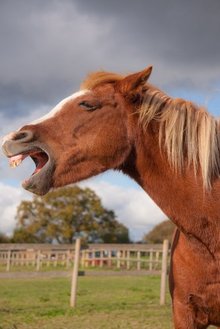Location: SAN DIEGO, California
At least two dozen cases of a mysterious skin condition in horses in Southern California have been reported by vets and horse owners to the California Department of Food and Agriculture’s Animal Health and Food Safety Services Division.

Alfalfa + Sun = Unhappy horse
Veterinarians have determined that rashes and what appear to be painful sunburn lesions causing the horses hair to fall out are the result of a hyper-sensitivity to direct sunlight leading to an infection called photodermatitis.
Veterinarians have determined that the rashes and what appear to be painful sunburn lesions causing the horses hair to fall out are the result of a hyper-sensitivity to direct sunlight leading to an infection called photodermatitis
The source appears to be tainted alfalfa hay from several hay distributors, with at least some from the Bishop area in the Eastern Sierra. Tests on hay have not found any toxic plant or chemical, said veterinary Dr. Kent Fowler, head of the state agency’s animal health branch.
“All the cases we’re aware of have been down in that Southern California area,” Fowler said. “There is a substance in this hay that is causing those horses to be very sensitive to direct sunlight. And our toxicologists believe that it is a naturally occurring substance in that hay.”
Tests are continuing at the California Animal Health and Food Safety lab at UC Davis. Toxicologists have not definitively identified that substance, said Fowler, describing it as a “very odd occurrence.”
The lack of water caused by the severe drought may have caused the levels of some ingredient in alfalfa hay to increase. The problem may stem from the hay being fed to horses very soon after it was cut and baled. The effect may lessen over time in hay that is kept awhile.
There may well be many more unreported cases, Fowler added. Photosensitization in horses isn’t required to be reported to the state agency unless the source of the illness is found or suspected to be toxic. But Fowler is encouraging vets to report the current cases.
The condition is typically not fatal, unless a secondary condition, such as an infection, gets out of control.
Treatment starts with getting horses under shelter or shade, and sometimes only turning them out at night. They should be kept out of sunlight until they heal. Open sores resulting from severe cases may get bacterial infections, which would then most likely require antibiotics administered by a veterinarian.
